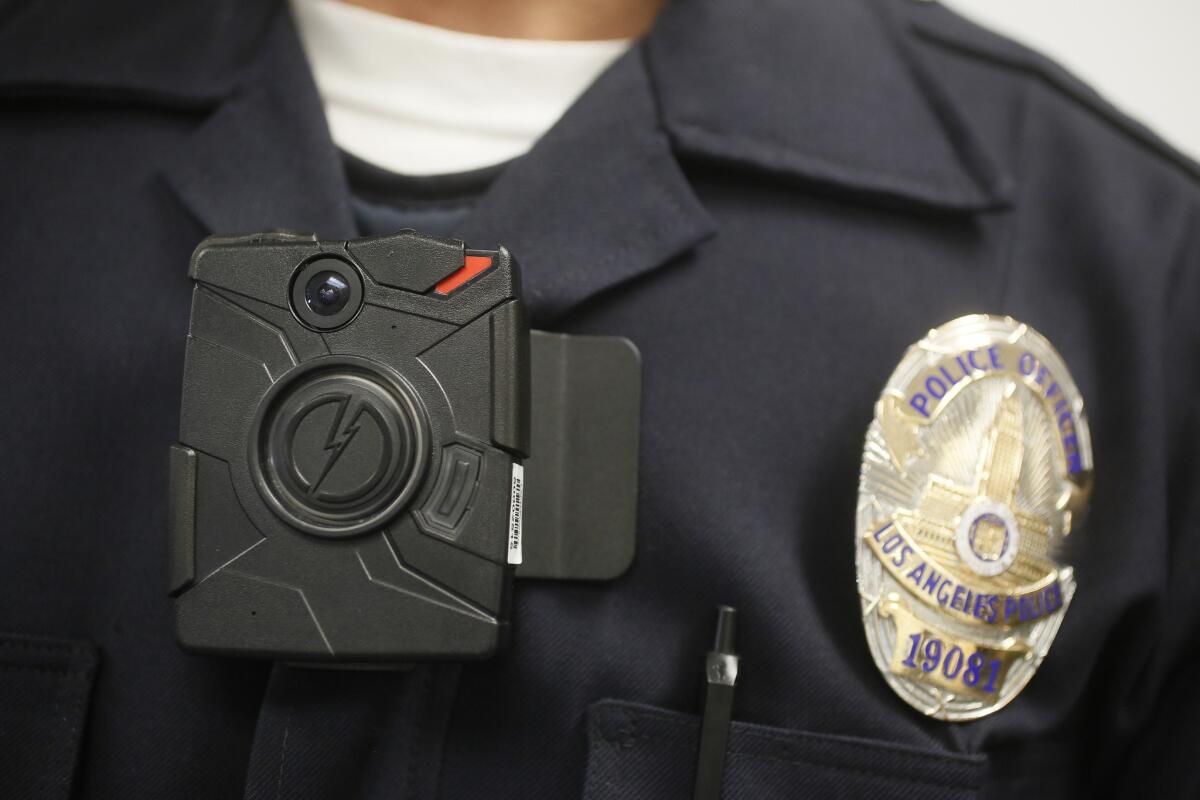L.A. City Council rightly halted the rapid rollout of police body cameras

A Los Angeles Police officer wears an on-body camera during a demonstration in Los Angeles in this Jan. 15, 2014 file photo.
- Share via
Large bureaucracies can be maddeningly slow to make major changes. That, however, is not what’s happening with the Los Angeles Police Department as it rolls out the body camera program. Police Chief Charlie Beck and Mayor Eric Garcetti have laid out an ambitious plan to have 7,000 field officers strapped and streaming by the end of next year.
This shows an admirable commitment to police accountability. Body cameras, studies show, change behavior in both officers and those with whom they interact, and their use correlates with an immediate reduction in use-of-force incidents. The sooner every LAPD officer has a body camera affixed to his or her uniform, the better.
Even so, it was absolutely appropriate that the Los Angeles City Council this month applied the brakes to the rapid rollout of the program after being presented with the details of the plan to buy thousands of cameras. The bill was enormous: $57.6 million over five years for equipment and video storage, and some 128 new positions — most of them to be held by sworn, uniformed officers.
Concerns have been raised about the [body cameras’] contracting process, climbing costs and surprisingly high staffing requests.
If the council had sticker shock it’s understandable. While everyone was aware that the cameras and accessories would come at a substantial cost, the last public word on the program’s price tag was Garcetti’s estimate last year that it would be in the “high single-digit millions.”
So what happened since the mayor’s estimate? Why did the cost increase fivefold or more? And why, given that this was the first hint that the cost might be skyrocketing, was the council given just a few days to vet the contract and staffing requests?
The council wisely put off approval of the program until next month. This is one of the most important initiatives undertaken by the Police Department in recent years, yet already concerns have been raised about the contracting process, climbing costs and surprisingly high staffing requests that must be addressed before the program is allowed to move forward.
First, the council needs to push back on the request for 128 new positions. The department is asking for six people right away to handle the new video generated by the cameras, but officials say the other 122 positions are justified because of all the extra work associated with the body camera program and the in-car camera program, which is in the midst of its department rollout.
It may well be the case that all the new demands of modern technology have changed the overall workload of officers and left the department short-staffed. But this is not the right time or place to discuss a significant force increase. If there’s a legitimate need to increase what has always been a perilously thin blue line, that’s a case that the chief ought to make as part of a broader discussion with city officials, and after we’ve seen just how this new technology adds — or subtracts — from the current workload.
The council should also demand answers about the $31.2-million contract with Taser International to provide the cameras and 4,400 Tasers. (The rest of $57.6 million is for smartphones, data plans and other related technology). Because the city did not go through the usual competitive bidding process and decided instead to “piggyback” on Kern County’s bidding process for just 30 cameras, the council can’t be sure that the city is getting a good deal. City and police officials seemed to favor Taser over others from the get-go, trying out only one other company in “competitive” trials two years ago. As it was, the city’s clear preference for Taser and the mayor’s tight deadline may have hurt L.A.’s negotiating power. Yes, a full competitive bidding process might have added months to the timeline, but it would have also left no questions about the contract. The LAPD should keep in mind the iPad debacle at the Los Angeles Unified School District in which nagging doubts about whether there was preferential treatment during the procurement process helped doom the whole project to failure.
It’s good to see the city’s elected representatives acting as watchdogs over the public treasury. They should maintain their vigilance until all the questions are adequately addressed, even if it slows down the process by a few weeks or even months. The body camera program is too important to allow even a shadow of doubt to linger.
Follow the Opinion section on Twitter @latimesopinion and Facebook
More to Read
A cure for the common opinion
Get thought-provoking perspectives with our weekly newsletter.
You may occasionally receive promotional content from the Los Angeles Times.









